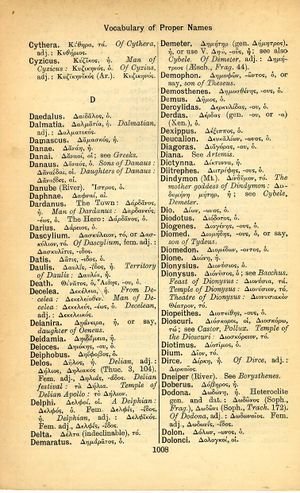Diogenes: Difference between revisions
Ὥσπερ αὐτοῦ τοῦ ἡλίου μὴ ὄντος καυστικοῦ, ἀλλ' οὔσης ζωτικῆς καὶ ζωοποιοῦ θέρμης ἐν αὐτῷ καὶ ἀπλήκτου, ὁ ἀὴρ παθητικῶς δέχεται τὸ ἀπ' αὐτοῦ ϕῶς καὶ καυστικῶς· οὕτως οὖν ἁρμονίας οὔσης ἐν αὐτοῖς τινὸς καὶ ἑτέρου εἴδους ϕωνῆς ἡμεῖς παθητικῶς ἀκούομεν → Just as although the Sun itself does not cause burning but has a heat in it that is life-giving, life-engendering, and mild, the air receives light from it by being affected and burned, so also although there is a certain harmony and a different kind of voice in them, we hear it by being affected.
m (Text replacement - "link={{" to "link={{") |
m (Text replacement - "}}]]" to "}}]]") |
||
| Line 1: | Line 1: | ||
{{WoodhouseENELnames | {{WoodhouseENELnames | ||
|Text=[[File:woodhouse_1008.jpg|thumb | |Text=[[File:woodhouse_1008.jpg|thumb | ||
|link={{filepath:woodhouse_1008.jpg | |link={{filepath:woodhouse_1008.jpg}}]]Διογένης, -ους, ὁ. | ||
}} | }} | ||
{{Lewis | {{Lewis | ||
Revision as of 10:10, 15 August 2017
English > Greek (Woodhouse)
Διογένης, -ους, ὁ.
Latin > English (Lewis & Short)
Dĭŏgĕnes: is, m., = Διογένης.
I Apolloniates, a celebrated Ionian philosopher, pupil of Anaximenes, Cic. N. D. 1, 12, 29.—
II The well-known Cynic philosopher of Sinope, Cic. Tusc. 1, 43, 104; id. N. D. 3, 34; id. Mur. 36 et saep.—
III A Stoic, teacher of Carneades and Laelius, Cic. Div. 1, 3, 6; id. Fin. 2, 8; id. Tusc. 4, 3; id. de Sen. 7 et saep.—
A friend of M. Caelius Rufus, Cic. Fam. 2, 12, 2; id. Cael. ib. 8, 8, 10.
Latin > French (Gaffiot 2016)
Dĭŏgĕnēs,¹¹ is, acc. em et en, m. (Διογένης),
1 Diogenes Apolloniates Cic. Nat. 1, 29, Diogène philosophe ionien, disciple d’Anaximène]
2 philosophe cynique : Cic. Tusc. 1, 104
3 surnommé le Babylonien, philosophe stoïcien : Cic. Div. 1, 6
4 peintre célèbre : Plin. 35, 40
5 ami de Cælius Rufus : Cic. Fam. 2, 12, 2.
Latin > German (Georges)
Diogenēs, is, Akk. em u. ēn, m. (Διογένης), I) D. Apolloniates, ein berühmter ionischer Philosoph, Cic. de nat. deor. 1, 29. – II) der bekannte zynische Philosoph aus Sinope, Cic. Tusc. 1, 104 u. 5, 92. Val. Max. 4, 3. ext. 4 (wo Akk. -ēn). – III) ein Stoiker, Lehrer des Karneades u. Lälius, Cic. de div. 1, 6 u.a. – IV) ein Freund des M. Cälius Rufus, Cic. ep. 2, 12, 2. Cael. in Cic. ep. 8, 8, 10 (wo Akk. -em).

